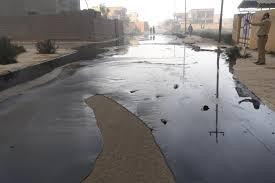
The Iraqi town of Qayyarah was liberated on August 28. A day later, UNICEF took part in a mission to assess the needs of families living there.
It’s the first time in two years that the United Nations has reached a town that’s been under the control of armed groups.
There are 15,000 people in Qayyarah, as well as 4,000 displaced from Mosul.
UNICEF Emergency Specialist Atheer Al-Yaseen was part of the mission. He spoke to UNICEF Communications Consultant Chris Niles.
When I entered Qayyarah I had a flashback of returning to my hometown of Baghdad after the invasion of 2003. I’d been away for many years as a refugee. 2003 was the first time back since I was a young child.
In Qayyarah, as I had seen in Baghdad, there’s no security. People are scared and shocked. There are dead bodies in the street, and the city is littered with improvised explosive devices and mines. There are many military prisons, military graffiti, and white flags everywhere – on cars, trucks and the roofs of houses.
It was 48° C that day, and we could hardly breathe. Retreating armed groups had opened up oil pipes running through the town.
The streets are flowing with oil and a lot of it is on fire, so the air is dark with smoke. All you can smell is smoke. Your lungs itch.
People don’t open their doors. You can’t blame them, they don’t know what’s going to happen. The front line is seven kilometres away, and they don’t know if the armed groups are coming back. They stockpile basic supplies, and stay behind locked doors. It’s basic instinct: food and security.
You could see the trauma in children’s eyes. I tried to talk to them, but they refused to reply. I saw hundreds of children, and not one said a word to me, even though I speak Arabic. I gave them cookies, which they took, and quickly ran away. Their only communication was to flash the victory sign.
There’s one hospital in the town, but we couldn’t get in because it’s been mined. The primary health clinic is surround by a river of oil, so it’s not accessible either.
UNICEF’s first priority is water and sanitation. Crude oil is flowing into the Tigris River. The town’s drinking water comes from the river, and although it’s being filtered, there’s no chlorination. The families we spoke to said they have diarrhea and fever. We’re arranging secure chlorine supplies for the water treatment plant, as well as a full-time mobile health team.
We have distributed 5,400 emergency kits via the Rapid Response Mechanism (RRM). They contain enough basic supplies to cover a family of seven for one week.
But there’s a lot more work to be done.
Source: UNICEF
 FR
FR EN
EN AR
AR








